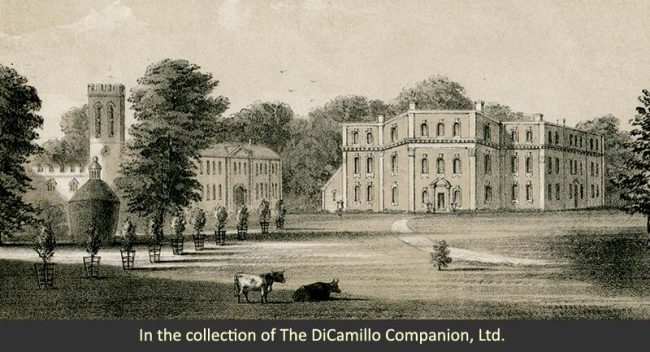
A 19th century lithograph of the third house (right) from "Burke's Visitation of Seats"
Earlier Houses: In the Middle Ages the first house at Chicheley was owned by the Pagnell family, who donated the estate to the church. In 1545, after the Dissolution of the Monasteries, Chicheley was sold to the successful wool merchant Anthony Cave, who built a new house (the second house) on the site. Cave’s daughter and heir, Judith, married her cousin, William Chester (who established the first sugar refinery in England), and their descendants owned the estate until the mid-20th century. In 1645, during the English Civil War, the house was shelled, sacked, and plundered by Parliamentary forces (the Chesters were Royalists) and later abandoned and demolished.
Built / Designed For: Sir John Chester, 4th Bt.
House & Family History: The current Chicheley (the third house), which took over 900,000 bricks to build in the early 18th century, is famous for its front door, which was modeled on an engraving of Bernini's Chapel of the Holy Cross in the Vatican. The unusual grand staircase contains three types of balusters (corkscrew, spiral, and straight) on each step and features small Corinthian columns at the corners. The library has the rare feature of pilasters that are hinged panels that open to reveal cupboards. (There is a similar room at Blithfield, home of the Bagot family). The Jacobean Room is the only space that contains remnants of the Caves’ 16th century house. During World War II the house was used by the Special Operations Executive (SOE) as Special Training School No. 46. From 1942 until 1943 Chicheley was used for training Czechoslovak nationals for SOE parachute missions into Nazi-occupied Europe. After the war the house served as a school. In 1952 the 2nd Earl Beatty (the 1st Earl was a famous naval hero of World War I) purchased Chicheley from descendants of the Chester family. In June 2007 the house and 75 acres were listed for sale (for only the second time in its history) by Lady Nutting and her son, the 3rd Earl Beatty, for £9 million; the price dropped to £7 million in October of 2007. Chicheley was purchased by the Royal Society for £6.5 million, funded in part by Fred Kavli (the contents were distributed among family members). The Royal Society spent £12 million renovating the house and adapting it to become the Kavli Royal Society International Centre, a venue for science seminars and conferences, a purpose Chicheley served until 2020, when the Kavli center closed during the Covid-19 pandemic. In 2021 the house reopened as Chicheley Hall Hotel. For many years it was mistakenly believed that Chicheley was the work of Thomas Archer; it is now known, through surviving documents, that the house was designed by Francis Smith of Warwick.
Comments: Chicheley is considered one of the least altered and finest early 18th century houses in England. Marcus Binney, writing in "The Times" (London), called Chicheley "one of the dozen finest and loveliest English country houses that will ever come on the market."
Garden & Outbuildings: The house sits within a park of 100 acres (designed in 1700 by George London, 20 years before the house was built) and includes the Grade II*-listed dovecote, the summerhouse (Grade II-listed), and the very fine 1720s, Grade II*-listed stableblock.
Chapel & Church: The church is primarily from the 14th century; between 1704 and 1705 the chancel was rebuilt by Sir John Chester, 4th Bt.
Architect: John Chester
Date: 1719-23Architect: Burrell Massingberd
Date: 1719-23Architect: Henry Flitcroft
Date: Circa 1722John Bernard (J.B.) Burke, published under the title of A Visitation of the Seats and Arms of the Noblemen and Gentlemen of Great Britain and Ireland, among other titles: Vol. I, p. 94, 1852.
Country Life: XVII, 594, 1905. LXXIX, 482, 508, 534, 1936. CLVII, 378, 434, 498, 1975. Apr 21, 2004. Jun 6-7 (sale), 2007. Jun 21, 2007. Oct 4, 2007.
Title: Biographical Dictionary of British Architects, 1600-1840, A - HARDBACK
Author: Colvin, Howard
Year Published: 2008
Reference: pg. 381
Publisher: New Haven: Yale University Press
ISBN: 9780300125085
Book Type: Hardback
Title: Biographical Dictionary of British Architects, 1600-1840, A - SOFTBACK
Author: Colvin, Howard
Year Published: 1995
Reference: pg. 887
Publisher: New Haven: Yale University Press
ISBN: 0300072074
Book Type: Softback
Title: Glory of the English House, The
Author: Esher, Lionel
Year Published: 1997
Publisher: London: Barrie & Jenkins
ISBN: 0752904434
Book Type: Hardback
House Listed: Grade I
Park Listed: Grade II*
Past Seat / Home of: SEATED AT FIRST HOUSE: Fulk Paynel (Pagnell), Lord of Newport Pagnell, 11th century. SEATED AT SECOND HOUSE: Anthony Cave, until 1558. Sir Anthony Chester, 1st Bt., 1577-1635; Sir Anthony Chester, 2nd Bt., until 1652; Sir Anthony Chester, 3rd Bt., until 1698; Sir John Chester, 4th Bt., 1714-20. SEATED AT THIRD (CURRENT) HOUSE: Sir John Chester, 4th Bt., 1720-26; Sir William Chester, 5th Bt., 1726; Sir John Chester, 6th Bt., 1726-48; Sir Charles Bagot Chester, 7th Bt., 1748-55; Charles Bagot Chester, until 1838; Charles Anthony Chester, 1838-58; Charles Montague Chester, 1858-79; The Rev. John Greville Chester, late 19th century. Sir George Farrar (tenant), early 20th century. David Field Beatty, 2nd Earl Beatty, 1952-72. Diane, Lady Nutting, until 2007.
Current Ownership Type: Corporation
Primary Current Ownership Use: Hotel
Ownership Details: Since 2021 Chicheley Hall Hotel
House Open to Public: By Appointment
Phone: 01234-230-396
Email: [email protected]
Website: https://chicheleyhall.co.uk/
Historic Houses Member: No